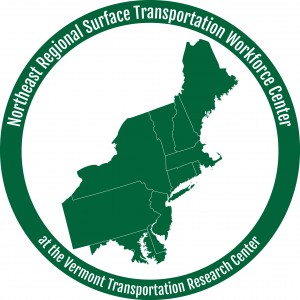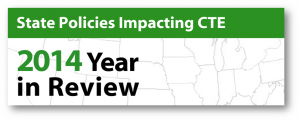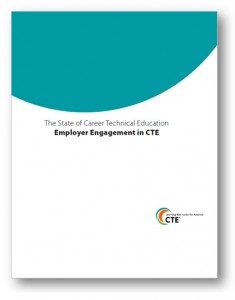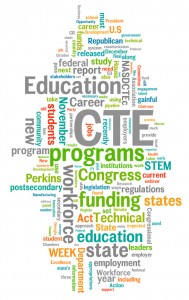On June 1, Advance CTE hosted the first session of a five-part summer lunch and learn series delving into each of the five principles of Without Limits: A Shared Vision for the Future of Career Technical Education (CTE Without Limits). Each session features a panel of leading voices from organizations across learning and work followed by interactive group discussions on the information shared and next steps.
 This session discussed the first principle of CTE Without Limits, featuring perspectives from organizations representing state elected officials, state and local education administrators and workforce leaders: Amanda Winters, Program Director for Postsecondary Education at the National Governors Association (NGA); Najmah Ahmad, Program Director for the Career Readiness Initiative at the Council of Chief State School Officers (CCSSO); and Yvette Chocolaad, Workforce Policy and Research Director at the National Association of State Workforce Agencies (NASWA).
This session discussed the first principle of CTE Without Limits, featuring perspectives from organizations representing state elected officials, state and local education administrators and workforce leaders: Amanda Winters, Program Director for Postsecondary Education at the National Governors Association (NGA); Najmah Ahmad, Program Director for the Career Readiness Initiative at the Council of Chief State School Officers (CCSSO); and Yvette Chocolaad, Workforce Policy and Research Director at the National Association of State Workforce Agencies (NASWA).
Themes
Throughout the panel and breakout sessions, several key themes emerged on the most urgent areas of action and foundational steps to be taken at the local, state and organizational level:
- State Leaders as Visionaries: Both Amanda Winters (NGA) and Najmah Ahmad (CCSSO) emphasized the role of governors and state education administrators as the visionaries and drivers for organizational change needed to realize this principle, from providing flexibility in funding and funding models to connecting state initiatives for economic growth, postsecondary attainment, racial equity and more into a larger vision for systemic change. Ahmad also highlighted the role of organizations supporting state leaders in providing tools and guidance for that leader’s vision to reach local education agencies and translate into tangible, meaningful action.
- Yvette Chocolaad (NASWA) emphasized the importance of designing infrastructure with flexible capacity to support collaboration across sectors, integrated services and innovative funding models. In doing so, systems can be truly responsive to the changing and flexible paths taken by learners to education and employment. This infrastructure can span informational technology and administrative and business service to physical building design and upgrades.
- All partners emphasized that investment in career advising, coaching and job search professionals who are often “overloaded and undervalued” as critical to build a cohesive career preparation ecosystem with seamless transitions among education and work experiences.
- Promising potential of federal stimulus funding: All panelists elevated federal stimulus funding as a historic opportunity to reimagine infrastructure and state initiative investment in the lens of CTE Without Limits and not just make upgrades to existing systems.
During the breakout sessions, attendees elevated the importance of involving learner voice in the design of career preparation ecosystems and prioritizing the needs of learners with those of other stakeholders such as government and industry. Attendees also highlighted the need for manageable, tangible steps from both the top down and the bottom up to enact lasting change, and the acknowledgement that true cohesion between systems of learning and work is extremely complex and all partners will be learning during the execution of this principle.
First Steps
The foundational steps offered by the panelists may seem obvious at first glance, but are often skipped in favor of pursuing project-based work and are critical to establishing a shared understanding of success.
- Shared Vision and Definitions: Chocolaad elevated the importance of cultivating a shared vision, metrics and data infrastructure among all stakeholders at the outset of this work. The need for comprehensive, informed and accurate data was termed a “shining light” for executing both this first step and the principle at large.
- Leadership Buy-in: Winters emphasized the importance of governors and other top leaders specifically communicating their commitment to making systemic change and collaboration a priority when current systems are designed to encourage siloed progress.
- Equity at the Center: Ahmad elevated the importance of centering equity, a foundational commitment within CTE Without Limits, in all aspects of implementation but particularly in determining the “who and the why” of systemic change. The prior two recommendations are strongly connected to this step, as a shared understanding and equity is critical to measuring progress towards equitable career preparation ecosystems.
Visit the CTE Without Limits web page to read the full vision and access resources to communicate the vision to stakeholders, including a promotional video, slide deck and five sector-focused fact sheets.
Register for Advance CTE’s second lunch and learn scheduled for June 22 at 4:00PM ET featuring Amanda Bergson-Shilcock, Senior Fellow at the National Skills Coalition; Mimi Lufkin, CEO Emerita at the National Alliance for Partnerships in Equity; and Stephanie McGencey, Executive Director at the American Youth Policy Forum







